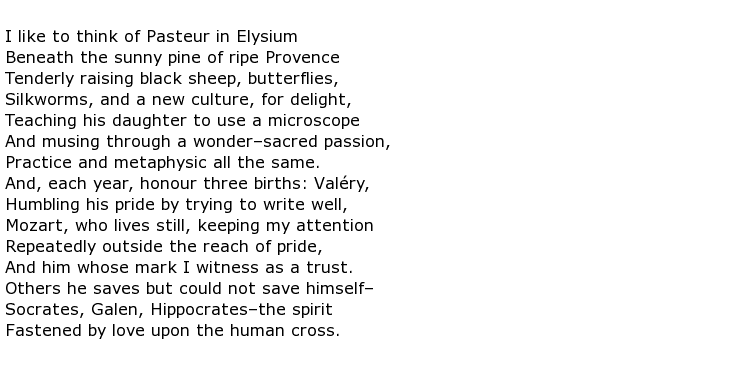 Edgar Bowers was a 20th century American poet whose poetry output, though relatively modest, won him two Guggenheim Foundation fellowships and a Bollingen prize for poetry. It was said that his experiences in Germany at the end of the Second World War, where he served in Counter Intelligence, had a profound effect on both his life and his writing. He remained in Bavaria for a year following the end of the war. On his return to California, he was able to complete unfinished graduate studies and then went on to be a professor of English at the University of California in Santa Barbara.
Edgar Bowers was a 20th century American poet whose poetry output, though relatively modest, won him two Guggenheim Foundation fellowships and a Bollingen prize for poetry. It was said that his experiences in Germany at the end of the Second World War, where he served in Counter Intelligence, had a profound effect on both his life and his writing. He remained in Bavaria for a year following the end of the war. On his return to California, he was able to complete unfinished graduate studies and then went on to be a professor of English at the University of California in Santa Barbara.
Bowers was born on the 2nd March 1924 in the small town of Rome, Georgia. It was an unremarkable childhood and his horticultural father was the owner of a plant nursery. Progressing through high school he went on to the University of North Carolina at Chapel Hill where he earned a Bachelors’ degree. His studies were then interrupted by a call up to military service and he was sent to Germany for the latter stages of the war. He ended his service at Hitler’s wartime retreat which was known as the “Eagle’s Nest” in the southern Bavarian town of Berchtesgaden. He remained there for a year after the end of hostilities, helping the country back to stability following the defeat of the Nazis.
On his return to the United States he went back to his studies at the University of North Carolina, and then went on to Stanford University where he gained a PhD in English. He then took up a teaching career while producing five volumes of poetry over a period of some forty years. His first was published in 1956, called The Form of Loss and his final effort, Collected Poems (1997) was remarkable in that it numbered only 168 pages. One theory behind that was that Bowers wrote in such an intense way that he seemed to commit maximum effort and consideration into every line, thus resulting in a fairly modest output throughout his lifetime. His themes covered most aspects of human existence. He described the basic needs of people, the joy to be found in ordinary lives and, sometimes, the violent experiences that cloud that joy.
Bowers won the Bollingen Prize for his book For Louis Pasteur which was published in 1990. He had a deep interest in the social uses of science and he made a point of celebrating Pasteur’s birthday every year, along with those of Mozart and Paul Valéry. Bowers appreciated and revered these great men, in particular their scientific minds along with “a love of art that is elegant, cerebral and orderly”. Here is the last verse of the poem For Louis Pasteur :

His early writing displays elements of stoicism but later efforts are influenced by the “increasing acceptance of the physical world,” which includes all aspects of sex and love. Bowers had been mentored at university by Yvor Winters and, in some ways, he copied his style and artistic ethos. Many believe though that the poetry of Edgar Bowers was better than that of Winters, whether it be in traditional rhyme or his very fine examples of blank verse.
His work was spare and compact, often containing metaphysical subject matter. The following quotation is attributed to Clive Wilmer, the literary correspondent in the Guardian newspaper:

Edgar Bowers moved to San Francisco when he retired from teaching in 1991 and remained there until his death on the 4th February 2000, aged 75.

